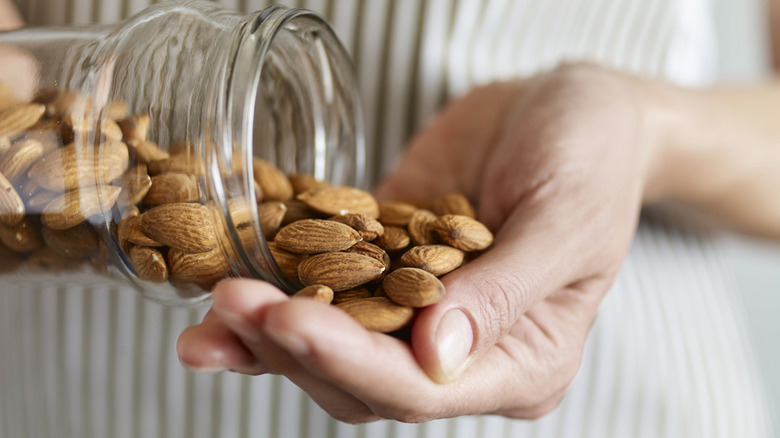The Plant-Based Beverage That Could Help Lower Cholesterol
Since high cholesterol doesn't cause any obvious symptoms, you might not realize you have it until you get a blood test. But there's good news: Even if your cholesterol is higher than the upper normal limit of 200 milligrams per deciliter (mg/dL), you can help bring it down by eating heart-healthy foods.
The list of foods and beverages that can naturally lower high cholesterol is long, and it includes almond milk. If you haven't tried it, almond milk is a creamy-looking byproduct that occurs when you mix freshly ground almonds with water.
What's so special about almond milk, especially if you're trying to decrease your cholesterol? Registered dietitian Angel Luk explained to Health Digest that one of the biggest factors that makes cholesterol potentially beneficial is the type of fat found in almonds. "Almond milk usually contains less saturated fat than animal-based milk options such as cow or goat milk." However, she stressed the need to check both the nutrition facts label and the ingredients list "to ensure no other ingredients are added that would increase the saturated fat content, such as coconut."
A heart-healthy milk that's derived from tree nuts
For every 100 grams of unsweetened almond milk you drink, you can expect about 0.1 grams of saturated fat. In contrast, 100 milligrams of low fat cow's milk contains around five times more saturated fat. Limiting your everyday consumption of saturated fats is one of the recommended methods to keep cholesterol levels in check.
The inverse relationship between almonds and cholesterol (e.g., higher almond consumption, lower cholesterol) has been previously documented. For instance, a 2011 review in Nutrition Review explored the effect of eating almonds on low-density lipoprotein (LDL) cholesterol. (That's the type that can build up in your blood vessels and cause chronic and life-threatening problems.) Per the review, almonds reduced the levels of LDL in the blood, likely due to their cardioprotective nutrients.
A 2020 study in the American Journal of Clinical Nutrition also looked at the cholesterol-reducing power of almonds. For six weeks, participants ate snacks consisting of almonds or baked goods. Those who ate almonds saw a decline in their LDL cholesterol.
Using almond milk in the kitchen
You should check the ingredients before assuming all almond milk is the same. As Luk indicated, almond milk manufacturers sometimes add oils, as well as calorie-packed sweeteners, to their products. Depending upon the added substance (e.g., sugar), you could be drinking a beverage that's less healthy than you thought.
That said, you don't have to sip on almond milk to make it part of your daily meal plans since it can generally go wherever you'd normally use dairy-based milk. Luk encouraged pairing almond milk with other foods for both heart-friendly and palate-pleasing results. For example, you can make overnight oatmeal with almond milk, oats, chia seeds, ground flaxseed, and banana, which, per Luk, boasts "an abundance of sticky soluble fiber while being very low in saturated fat."
Almond milk can be a great replacement ingredient in certain recipes, too. "Almond milk and applesauce as a replacement for cow's milk and oil in traditional muffin recipes would yield a much lower saturated fat baked good," advised Luk.
One precaution you need to take with almond milk: It may trigger allergies in people who can't tolerate tree nuts. In that case, you may need to explore different plant-based milk options with low saturated fat (like soy milk) to help you achieve a more normal cholesterol level.



